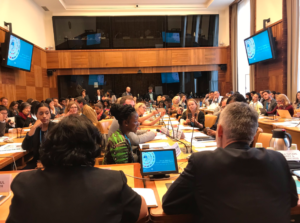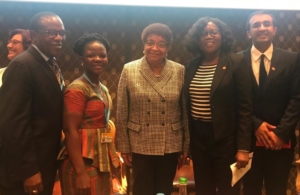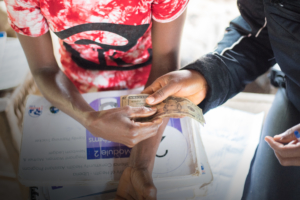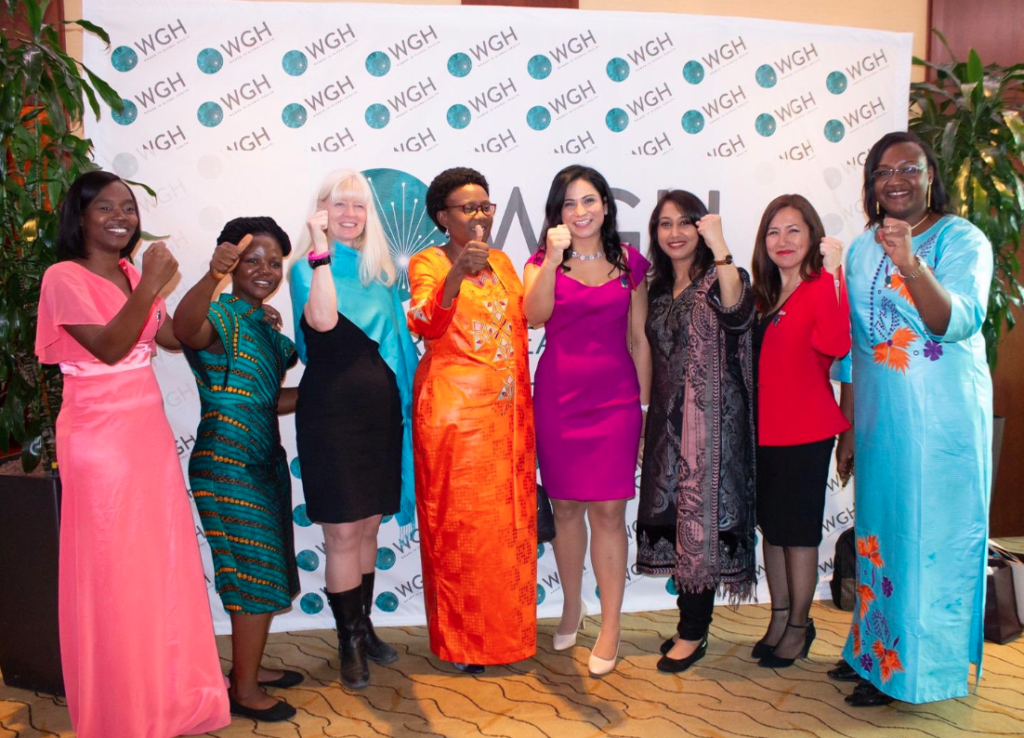Paid Community Health Workers are critical for Universal Health Coverage
In a historic vote, 193 member states unanimously passed a resolution recognizing the contributions made by community health workers (CHWs) to achieve universal health coverage, respond to health emergencies, and promote healthier populations. The resolution urges countries and partners to use the World Health Organization guidelines to optimize CHW programs—which declares CHWs must be well trained, supervised, and, importantly, paid for their work.
“To see countries making real commitments and real investments, arguing for the rights of health workers to be paid and contracted and supervised, and advocating for stronger quality of care at the last mile is incredibly inspiring,” said Raj Panjabi, CEO of Last Mile Health.
Payment for CHWs is not just the right thing to do; it’s the smart thing to do to advance gender equity. Despite holding 70% of the jobs in the health workforce, a recent report by the World Health Organization and Women in Global Health found that the majority of female health workers are often underpaid or even unpaid. This means that the poorest women in the world subsidize global health by over $1 trillion dollars in the form of unpaid work. The barriers faced by female health workers not only undermine their well-being and livelihoods, but it threatens collective progress towards universal health coverage.
Frontline Health Workers Deserve a Seat at the Table
As government representatives, donors, and global health professionals descended upon Geneva for the World Health Assembly, a group of frontline health workers left their home countries—some for the very first time—to represent and advocate for individuals working on the frontlines of primary healthcare in some of the world’s most remote communities.

Albertha Freeman speaks at WHA about her experiences as a nurse supervisor in Liberia’s National Community Health Assistant Program.
One of these advocates was Albertha Freeman, a nurse supervisor from Liberia’s Gbarpolu County, who was invited to speak about her experience supervising CHWs in one of Liberia’s most remote and challenging counties through the Government of Liberia’s National Community Health Assistant Program. Albertha shared stories of navigating dense rainforests and dangerous roads to reach remote communities to mentor CHWs, and ultimately provide lifesaving primary healthcare. When speaking about what motivates her, she said, “I refuse to accept poor care for poor people.” Before joining the national program, she worked as a nurse at a clinic where she remembers treating the same patients repeatedly for recurring health issues. She realized that to achieve lasting changes in health outcomes, she needed to work at the community level. Now, she supervises CHWs directly in their own communities and has built trust and intimate knowledge of her patients. This connection enables her to better provide healthcare and strengthens the continuum of care at the facility level. “The most important lesson I’ve learned is that the community must be engaged in their own healthcare for lasting change to happen,” she said.
Since the historic inception of Liberia’s National Community Health Assistant Program, Albertha and over 3,300 of her fellow nurse supervisors and CHWs have contributed to unprecedented health gains in rural communities, including improved treatment rates among children and increases in facility-based delivery. Globally, they are part of a growing movement that is advancing universal health coverage by putting the last mile first – and they have vital insights to share at convenings like World Health Assembly.
In recognition of her work to advance health for all, Women in Global Health honored Albertha Freeman with a Heroines of Health award. “Women are the leaders of health in their communities. We are thrilled to recognize frontline Heroines of Health who are leading the way for community health through their unwavering commitment to taken on the toughest health challenges,” said Roopa Dhatt, Executive Director and Co-Founder of Women in Global Health. In Liberia, where employment opportunities are limited in remote areas of the country, the National Community Health Assistant Program functions as one of the largest employers of rural women in healthcare like Albertha.
Investing in the Global Health Workforce Must be a Priority
Over half of the world’s population lacks access to essential health services. Low- and middle- income countries will be short of an estimated 18 million health workers needed to achieve universal health coverage. A compelling body of evidence suggests that if we were able to marshal a global movement to hire, train, and equip high-performing rural community health workforces, we could close this gap, and ultimately save lives.
During the World Health Assembly, advocates like Dr. Tedros, Director-General of the World Health Organization, called for increased global investment in the health workforce— including national CHW programs. Opening a session on health workforce investment, Last Mile Health CEO Raj Panjabi urged partners to seek out investments in community health workers, stating, “We invest in what we value, and we value what we invest in.”
In recognition of the need to invest in health workers globally, Ellen Johnson Sirleaf, former President of Liberia, was appointed by WHO as the Goodwill Ambassador for Health Workforce. Johnson Sirleaf believes investing in the health workforce pays lasting dividends, stating, “Once you get the health workers and you get them paid and you get them moving, they are then able to inspire the community to do other things.” In this role, she will garner new momentum to invest in the education and employment of health workers, particularly women, to achieve universal health coverage. This honor is in recognition of Her Excellency President Sirleaf’s critical leadership in post-Ebola efforts to scale up primary healthcare through the establishment of the National Community Health Assistant Program—an initiative with the potential to scale and sustain nationwide under the leadership of President George Weah and Minister of Health Wilhelmina Jallah through new innovative partnerships with Co-Impact and Gavi, among others.

From left to right: Dr. Francis Kateh, Chief Medical Officer for Liberia; Albertha Freeman, Nurse Supervisor with Liberia’s National Community Health Assistant Program; Ellen Johnson Sirleaf, former President of Liberia; Wilhelmina Jallah, Liberia Minister of Health; and Raj Panjabi, Last Mile Health CEO.
As the world advances universal health coverage, a collective effort to ensure CHWs are at the forefront of health workforce investments will guarantee communities in the most remote areas have access to primary health care. At the 72nd World Health Assembly, Alberta ensured she will be a steadfast supporter of these efforts, saying, “If you promise to invest in health workers, I can continue the fight on the frontlines.” We look forward to walking alongside health workers like Albertha and partners on this journey.






